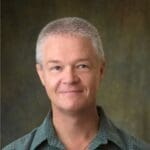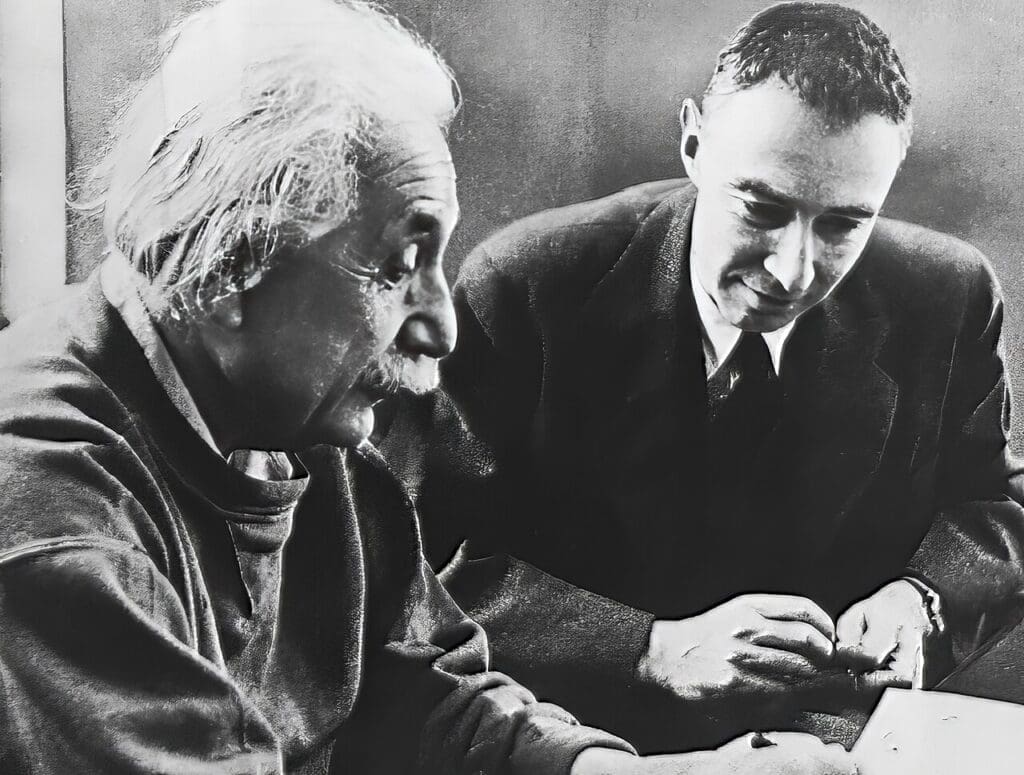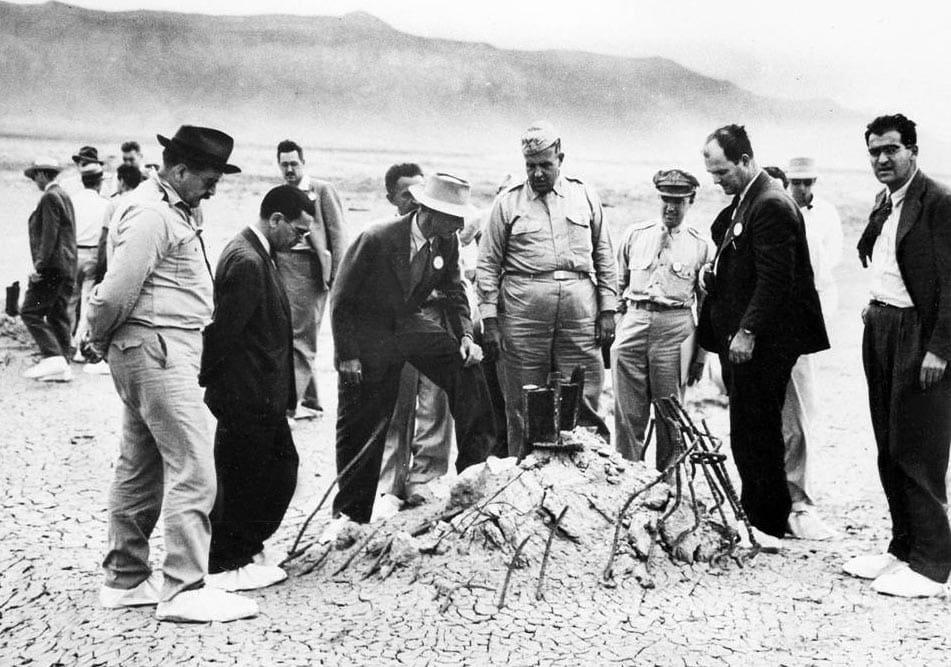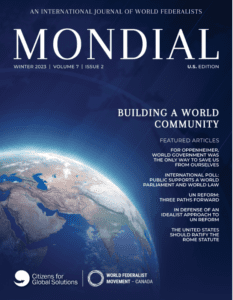Mondial Article (Winter 2023)
For Oppenheimer, a World Government Was the Only Way to Save Us From Ourselves

Jane Shevtsov
Ecologist and board member of the Citizens for Global Solutions. She teaches math for life sciences at the University of California, Los Angeles.

Tad Daley
Served as a coauthor, speechwriter, or advisor to five members of the United States Congress, including the late U.S. Senator Alan Cranston and the late U.S. Senator Harris Wofford. He also served for several years as a member of the International Policy Department at the RAND Corporation.
Blink and you’ll miss it.
In a scene in the new Oppenheimer film set right after the successful 1949 atomic bomb test by the USSR, there is a brief exchange between the film’s two main antagonists. Lewis Strauss, chair of the Atomic Energy Commission, asks Robert Oppenheimer what he thinks should be done now. “International control,” Oppenheimer immediately replies.
“You mean world government?” Strauss fires back.
It sounds like a throwaway line, or one of those accusations routinely hurled at those trying to make global institutions marginally more effective. But in this case, Chairman Strauss’ epithet was spot on.
The tremendous destruction of World War II, even before Hiroshima and Nagasaki, prompted a radical rethinking of the world political order. In particular, the idea of world government as the solution to the problem of war was placed front and center in this country’s foreign policy debate, and argued about passionately in diners, dorm rooms, and dinner parties all across the land. Unfortunately, however, the legions of moviegoers who buy tickets to Christopher Nolan’s otherwise excellent film this summer will have no idea that one of the leading proponents of that singular idea was J. Robert Oppenheimer.
After the bomb was dropped on Hiroshima, Oppenheimer threw himself into working to control nuclear weapons. Like other atomic scientists, he was fully aware that the Soviet Union would likely develop its own atom bombs in just a few years, and that time was short to prevent an unrestrained nuclear arms race. The movie refers to his activities as working for “international cooperation.” But his actual ideas were much deeper and more radical than those anodyne words imply.
In 1946, Oppenheimer participated in the development of a report for the Secretary of State’s Committee on Atomic Energy about what might be done to control nuclear weapons. The report, which became known as the Acheson-Lilienthal report but which was authored chiefly by Oppenheimer himself, proposed an international Atomic Development Agency that would have the sole right to mine and process uranium and to run reactors of any kind. This was a radical proposal, but, as its authors explained, they could see no alternative.
In June 1946, Oppenheimer published an article in The New York Times Magazine explaining the proposal to the public. The article discussed the relationship between peaceful and military uses of atomic energy, evaluated a couple of other ideas for controlling atomic weapons, and then discussed the proposed Atomic Development Agency.
It is here, in a section entitled “Sovereignty,” that we come across a striking passage:
“Many have said that without world government there could be no permanent peace, and without peace there would be atomic warfare. I think one must agree with this. Many have said that there could be no outlawry of weapons and no prevention of war unless international law could apply to the citizens of nations, as federal law does to citizens of states, or we have made manifest the fact that international control is not compatible with absolute national sovereignty. I think one must agree with this.”
Similarly, in a January 1948 article for Foreign Affairs magazine, Oppenheimer wrote:
“It is quite clear that in this field we would like to see patterns established which, if they were more generally extended, would constitute some of the most vital elements of a new international law: patterns not unrelated to the ideals which more generally and eloquently are expressed by the advocates of world government.”
From the vantage point of 2023, the remarkable thing about these passages is the apparent assumption that the reader is familiar with the idea of world government, and arguments for and against it, to the point where they can just be mentioned without explanation or elaboration. And for much of the public for much of the 1940s, this was probably true — as remarkable as it might seem to us today, when this notion is entirely absent from the international affairs debate.
Even before the end of the war, world government advocacy had become a prominent feature of the political conversation in America. In 1943, the businessman and Republican presidential candidate Wendell Willkie published a book called One World. The book sold 1.5 million copies in the four months following its release and played a key role in a blossoming of world federation advocacy — long before virtually anyone had heard of anything like an atomic bomb. To choose but one example, an organization known as the Student Federalists, founded in 1942 by a charismatic 16-year- old boy named Harris Wofford, over the next several years formed 367 chapters on high school and college campuses around the country. Mr. Wofford went on to become a U.S. senator and a key civil rights aide in the White House of President John F. Kennedy.
Then in 1945, just a few months before the Trinity test, came Emery Reves’ The Anatomy of Peace. While Willkie’s book was a travelogue describing his voyage around the world, Reves’ was an extended logical argument that only law could create peace and only a world federation — a union of nations with a government taking care of issues that could not be handled at the national level — could create meaningful law that applied to individuals rather than governments. Indeed, Oppenheimer’s passage above could have easily been a summary of Reves’ book.
It wasn’t just books. Beloved children’s book author and New Yorker editor E. B. White devoted a great many of his editorials to the problem of global anarchy. These were later collected and published in a book called The Wild Flag: Editorials From The New Yorker on Federal World Government and Other Matters. Saturday Review editor Norman Cousins, upon reading about Hiroshima, wrote a lengthy editorial for his magazine titled “Modern Man is Obsolete,” that passionately argued for immediate democratic world federation. “There is no need to talk of the difficulties in the way of world government,” wrote Cousins. “There is need only to ask if we can afford to do without it.”
In a similar vein Walter Lippmann, a founder of both The New Republic magazine and the Council on Foreign Relations, and a key player later in the Cuban Missile Crisis, wrote in 1946: “There are few in any country who now believe that war can be regulated or outlawed by the ordinary treaties among sovereign states… no one can prove what will be the legislative, executive, and judicial organs of the world state… but there are ideas that shake the world, such as the ideal of the union of mankind under universal law.”

Albert Einstein, founding member of the World Federalist Association, with Robert Oppenheimer at the Institute for Advanced Study. Image courtesy of US Govt. Defense Threat Reduction Agency, Public domain, via Wikimedia Commons.
Even General Hap Arnold, the only U.S. Air Force officer ever to hold the rank of five stars and founder of the RAND Corporation, said in 1946: “The greatest need facing the world today is for international control of the human forces that make for war.” The atom bomb, he declared, presents “a tremendous argument for a world organization that will eliminate conflict… We must make an end to all wars for good.”
And before the end of the decade, more than 50,000 Americans had joined the United World Federalists (UWF) — led for three years by a bright young man named Alan Cranston, who went on to serve as a four-term U.S. Senator from California. UWF has continued its operations to this very day and is now known as Citizens for Global Solutions (CGS).
A number of physicists also came to support world federation. “Conflicts in interest between great powers can be expected to arise in the future… and there is no world authority in existence that can adjudicate the case and enforce the decision,” said Leo Szilard, who first conceived the nuclear chain reaction. But humanity had at its disposal, he insisted, “the solution of the problem of permanent peace… the issue that we have to face is not whether we can create a world government… [but] whether we can have such a world government without going through a third world war.”
Even Edward Teller, accurately portrayed in the Oppenheimer film as pushing for the development of the immensely more destructive hydrogen bombs and eventually undercutting his colleague at the security hearings, appeared to embrace the idea! In 1948, he discussed the “Preliminary Draft of a World Constitution,” written by a committee of eminent scholars chaired by the chancellor of the University of Chicago, Robert Maynard Hutchins, and aimed at establishing a “Federal Republic of the World.” And Teller said about this enterprise: “[America’s] present necessary task of opposing Russia should not cause us to forget that in the long run we cannot win by working against something. Instead we must work for something. We must work for World Government.”
But the most prominent and most active proponent of world government among scientists was Albert Einstein himself. He had always opposed nationalism, and supporting world federation was a natural extension. Einstein wrote articles, gave interviews, and helped found the Emergency Committee of Atomic Scientists. The Student Federalists of Princeton, New Jersey, held meetings in his living room. And he served as the founding advisory board chair of the UWF.
The type of world government that Einstein promoted would exclusively have power over security issues and a few internal circumstances that could lead to war. But this kind of limited world government was a must. “A new kind of thinking is essential if mankind is to survive and move to higher levels,” he said. “Often in evolutionary processes a species must adapt to new conditions in order to survive… In light of new knowledge… an eventual world state is not just desirable in the name of brotherhood; it is necessary for survival.”
Oppenheimer’s focus in the post-war years was more near-term. He worked for international control of nuclear matters — both weapons and civilian reactors that could be used to make weapons. But that international control was to take the form of an agency with a strict monopoly on such activities.

J. Robert Oppenheimer (in light colored hat with foot on tower rubble), General Leslie Groves (large man in military dress to Oppenheimer’s left), and others at the ground zero site of the Trinity test after the bombing of Hiroshima and Nagasaki (some time after the actual test). United States Army Signal Corps, Public domain, via Wikimedia Commons.
His 1946 New York Times Magazine piece says about the plan: “It proposes that in the field of atomic energy there be set up a world government. That in this field there be renunciation of national sovereignty. That in this field there be no legal veto power. That in this field there be international law.”
Why would this be significant? In a lengthier article published in 1946 in the Bulletin of the Atomic Scientists, Oppenheimer wrote, “the problem that we are dealing with,” in seeking to prevent atomic war, “is the problem of the elimination of war.” Proposals for addressing nuclear issues were to be judged on whether they also advanced this goal. The article was titled “The Atom Bomb as a Great Force for Peace” — not because of the simplistic and banal argument that the bomb would make war too horrible to contemplate, but because its control would lay the foundation for a world government that truly could abolish war.
And in his 1948 Foreign Affairs article, again, Oppenheimer maintained: “If the atomic bomb was to have meaning in the contemporary world, it would have to be in showing that not modern man, not navies, not ground forces, but war itself was obsolete.”
At the end of this essay, Oppenheimer returned to the noble aspirations that so many held in the shattering initial weeks after Trinity, Hiroshima, and Nagasaki:
“Theaimofthosewhowouldworkfortheestablishment of peace,” he insisted, “must be to maintain what was sound in the early hopes, and by all means in their power to look to their eventual realization. It is necessarily denied to us in these days to see at what time, to what immediate ends, in what context, and in what manner of world, we may return again to the great issues touched on by the international control of atomic energy… [But] this is seed we take with us, traveling to a land we cannot see, to plant in new soil.”
Should we consider all this just a mere historical curiosity? Is anything about these conversations eight long decades ago relevant to the challenges of the 21st century? As politically unlikely as it might now appear, might something like a genuine world republic provide humanity with the kinds of tools it will require to get a grip on existential perils like the climate emergency, runaway artificial intelligence, and who knows what kinds of new weapons of mass extermination that Oppenheimer’s heirs will almost surely invent in the decades and centuries to come?
The best possible answer to that is the same one purportedly given by China’s Premier Zhou Enlai in 1971, when asked by Henry Kissinger what he thought about the consequences of the French Revolution.
Mr. Zhou, the story goes, considered the question for a moment, and then replied: “I think it is too soon to tell.”
This article was originally published in the Common Dreams newsletter.
Mondial is published by the Citizens for Global Solutions (CGS) and World Federalist Movement — Canada (WFM-Canada), non-profit, non-partisan, and non-governmental Member Organizations of the World Federalist Movement-Institute for Government Policy (WFM-IGP). Mondial seeks to provide a forum for diverse voices and opinions on topics related to democratic world federation. The views expressed by contributing authors herein do not necessarily reflect the organizational positions of CGS or WFM-Canada, or those of the Masthead membership.





























